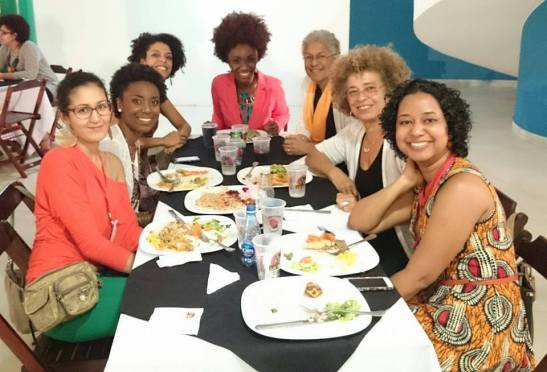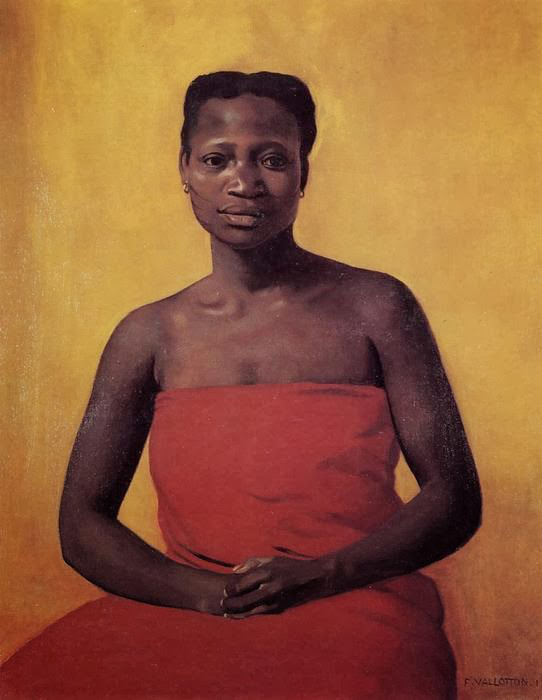
July 25, 2014
July 25th:
Brazil’s National Day
of Teresa de Benguela and
the black woman
– A brief history of
the warrior negra
for whom the day was named
Note from BW of Brazil: The recognition and recovery of the history of the black Brazilian has been a long, hard struggle over the period of a maximum of nearly five centuries but at least since 1888 when slavery was abolished in the country. Since the 1970s, Afro-Brazilian activists fought for the establishment of November 20th as theNational Day of Black Consciousness in recognition of the legendary quilombo (runaway slave/maroon society) leader of mythological proportions, Zumbi dos Palmares. But Zumbi was only one of countless, nameless or unrecognized heroes in the struggle for black equality in Brazil. Many of these warriors were in fact women. Tomorrow, July 25th, we celebrate the Afro-Latin American and Caribbean Women’s Day. Just last month, the day was officially established by law in honor of one of black Brazil’s “she-roes”, Tereza de Benguela. Below is brief report on the official sanctioning of the day and the warrior negra for whom the day was named after.
House Passes Dia Nacional de Tereza de Benguela e da Mulher Negra (National Day of Teresa of Benguela and of Black Women)
Courtesy of Câmara Notícias
The Comissão de Constituição e Justiça e de Cidadania (CCJ or Committee of Constitution and Justice and Citizenship) of the Câmara dos Deputados (House of Deputies) approved on Tuesday (April 1st) in conclusive character, Senate bill (PL 5746/09) that establishes the date of July 25 as the National Day of Tereza Benguela and Black Women. The proposal then goes for presidential approval.

The rapporteur of the project, Deputy Evandro Milhomen (PCdoB-AP) highlights that Tereza Benguela was a quilombo (maroon society) leader was one who lived in the state of Mato Grosso. “Under her leadership, the Quilombo Quariterê resisted slavery for two decades, and survived until 1770,” he maintained.
Latin America
The author of the text, the ex-Senator Serys Slhessarenko, highlights that in the whole of Latin America, only Brazil is not yet celebrating the International Day of Black Women on July 25. “It’s necessary to create a symbol for the black woman, such as exists in the myth of Zumbi dos Palmares. Women lack of black women heroines who strengthen the pride of their race and their history,” he argues.
The commission also approved the PL 5371/09 by Deputy Fátima Pelaes (PMDB-AP) in joint analysis, which includes on the national commemorative calendar, the 25th of July as Latin American and Caribbean Black Women’s Day.
National Day of Teresa de Benguela and Black Women
Tereza de Benguela is the name of Federal Law 12.987 of June 2, 2014
Courtesy of UNEGRO Rio de Janeiro
Tereza Benguela was a quilombo leader who lived in the eighteenth century. The wife of José Piolho who led the Quilombo do Piolho or Quariterê, on the outskirts of Vila Bela da Santíssima Trindade, in the state of Mato Grosso. When her husband died, Tereza took command of that quilombo, showing herself as an even more relentless and tenacious leader, Benguela commanded the political, economic and administrative structure of the quilombo, maintaining a defense system with weapons exchanged with white men or retrieved from nearby villages.
The iron objects used against the black community who took refuge there were transformed into a working instruments, as they dominated the use of the forge.
The Quilombo Quariterê besides the parliament and an advisor to the queen, developed cotton farming and possessed weaving looms where fabrics were manufactured that were marketed outside the quilombos, as well as surplus food. She was an emboldened warrior and commanded the Quilombo Quariterê in Mato Grosso. It is unclear whether she was African or Brazilian. It is said that it was she who led an uprising of blacks and Indians, settling near the city of Cuiabá, not far from the border of Bolivia today. For decades, Teresa led the Quilombo, which survived until 1770, in the XVIII century.
Enacted: Law No. 12.987, of June 2, 2014
Provides for the creation of the Dia Nacional de Tereza de Benguela e da Mulher Negra (National Day of Teresa of Benguela and Black Women).
The PRESIDENT OF THE REPUBLIC
I make it known that the Congress decrees and I sanction the following Law: …
Art. 1o – It is instituted the National Day of Teresa of Benguela and Black Women, to be celebrated annually on July 25.
Art. 2o – This Law shall enter into force on the date of its publication. Brasilia, June 2, 2014; 193rd of the Independence and 126th of the Republic.
Source: UNEGRO Rio de Janeiro, Câmara
__________________________

July 25, 2014
Why do we revere the 25th of July,
the Afro-Latin American and
Caribbean Women’s Day?
Note from BW of Brazil: Today is July 25th, the Afro-Latin American and Caribbean Women’s Day. A day in which black women reflect on the struggles for recognition, the right to self-determination and celebrate many hard won battles for equality, a brighter tomorrow and a more dignified representation. The path is a long one and the battle tiring in a struggle for basic things that in a proper world, wouldn’t need to be fought for. If you’re not sure of the struggles that black women in Brazil must endure, be sure to many of the posts on this blog delve into topics such as racism, the acceptance (and society’s rejection) of cabelo crespo (curly/kinky hair) and the development of black identity in a country that makes it clear that it wants to be white, just to get an idea.
The lives of black women must be revered; perhaps the saddest and most repugnant example of why happened last March when wife and mother Cláudia Silva Ferreira’s body was dragged on the ground from the back of a Military Police SUV. Ferreira’s death was just one of the many of the daily examples of being the most under-appreciated parcel of Brazil’s population. But we also celebrate the accomplishments of women such as writer Conceição Evaristo, Feira Preta’s creator Adriana Barbosa, andNilma Lino Gomes, the first black woman to be named dean of a federal university. Here at BW of Brazil, you will find many other examples of why July 25th is a special date. Historian Luciane Reis breaks it down a little more below…But for now…Happy Afro-Latin American and Caribbean Women’s Day!!

by Luciane Reis*
First published on the Blogueiras Negras blog

Black women have never recognized the myth of fragility that has always justified the subaltern spaces that were given to them. They learned very early how hard the work is in the spaces made available and above all that their lives were worth what they fought to have. The process that dehumanizes the black population, made it so that sexism over these women had a greater impact than in others, especially in the commercialization of their lives and bodies, in addition to their affection.
We know what the consequences of denying the role of black women in shaping the culture of the people are, especially in partisan politics and in the social area. Even among the most advanced and plural feminist movements, there is still a difficulty in recognizing black women who were present in the social movements and struggles and especially in their capacity of occupying these “privileged” spaces. The heroines and black intellectuals are made totally invisible in the historical processes.
After centuries of exploitation, there is still in an intense way the erotization and appropriation of black women, where the division between holy and profane ended up occupying the space of casual diversion. Nothing different from the past by black women in the diaspora as a whole and especially in Latin America, where this identity is legitimized from Euro-western roots, a root that rejects the black presence in history and everyday life that excludes and discriminates against them. Due to the common understanding of this reality in the Black Diaspora, a group of black women saw the need to start a debate at the international level on the situation of African descendant population, racism, discrimination and especially to question the European identity imposed on these people.
Faced with the realization that it is hard to be a Latin American black woman in a society constructed on racism and patriarchy, the Latin American countries were delineated via territorial, social, economic and political exclusion. These data confirmed the reality of the black diaspora in the racial perspective and especially the black women, where this identity implies suffering a double oppression historically constructed and the hegemony of one gender over the other. By understanding these facts, the need arises to construct a global identity with an articulation that would allow having greater visibility of the situation across the region.
These women internationalize the debate that makes the movement of Afro-Latina and Caribbean women emerge, thus contributing to the creation of the largest feminist black antenna. This approach allowed the approximation of professionals of communication, culture, academics and related areas that hegemonize the black struggle in the Diaspora in a continental way. From this articulation in 1992 in Santo Domingo, Dominican Republic, the 1st Meeting of Afro-Latin American and Afro-Caribbean Women was held, where took two decisions were made: the creation of the Rede de Mulheres Afro-latino-americanas e Afro-caribenhas (Network of Afro-Latin American and Afro-Caribbean Women) and the setting of July 25th as Afro-Latin American and Caribbean Women’s Day. A date that nowadays we are proud to celebrate.
July 25th internationalizes black feminism via agglutination of resistance of black women to citizenship in the regions in which they live, especially the oppressions of gender and ethnic-racial. Thus, this date extends and strengthens organizations and identity of black women, which has been constructing strategies for combating racism and sexism. This is not any arbitrary date for us black women, it means disrupting a feminism that never contemplated us. It redeems the struggle of black women of the diaspora started in the late 70′s through black feminists in different parts of the diaspora.
Celebrating July 25th is to celebrate and honor the development of new feminist perspectives, in particular the introduction of the difference in traditional feminist theory. After all we cannot forget that the feminism that emerged in the 1970s affirmed an homogeneous female identity, so it could not identify and visualize specific demands of women who suffered from the intersection of many conditions such as, gender, race, class, ethnicity, sexual orientation and religion.
Strengthening July 25th gives visibility and energy to the emancipation of black women from a feminism that placed gender oppression as a priority oppressive factor on women, without regard to the demands of black women. It is to strengthen the emancipation of a feminism that could not encompass the differences between them, i.e. look for multiple experiences and feminine identities.
Empowering this date is to contribute to the historical struggle of women who were and are the protagonists in the guiding and demanding of their countries a meeting of demands that nowadays improves the quality of life of the black population is to fight for the guarantee and amplification of the access to rights already conquered, mainly in the construction as a continent of Afro descendants as a transnational nation. It is this collective construction that we must believe in when we honor the 25th of July, the Dia da Mulher Afro-latino-americana e Caribenha/Afro-Latin American and Caribbean Women’s Day.
Source: Blogueiras Negras
* – Luciane Reis is an historian



long live the spirit of afro-latin american & caribbean women’s day on july 25!